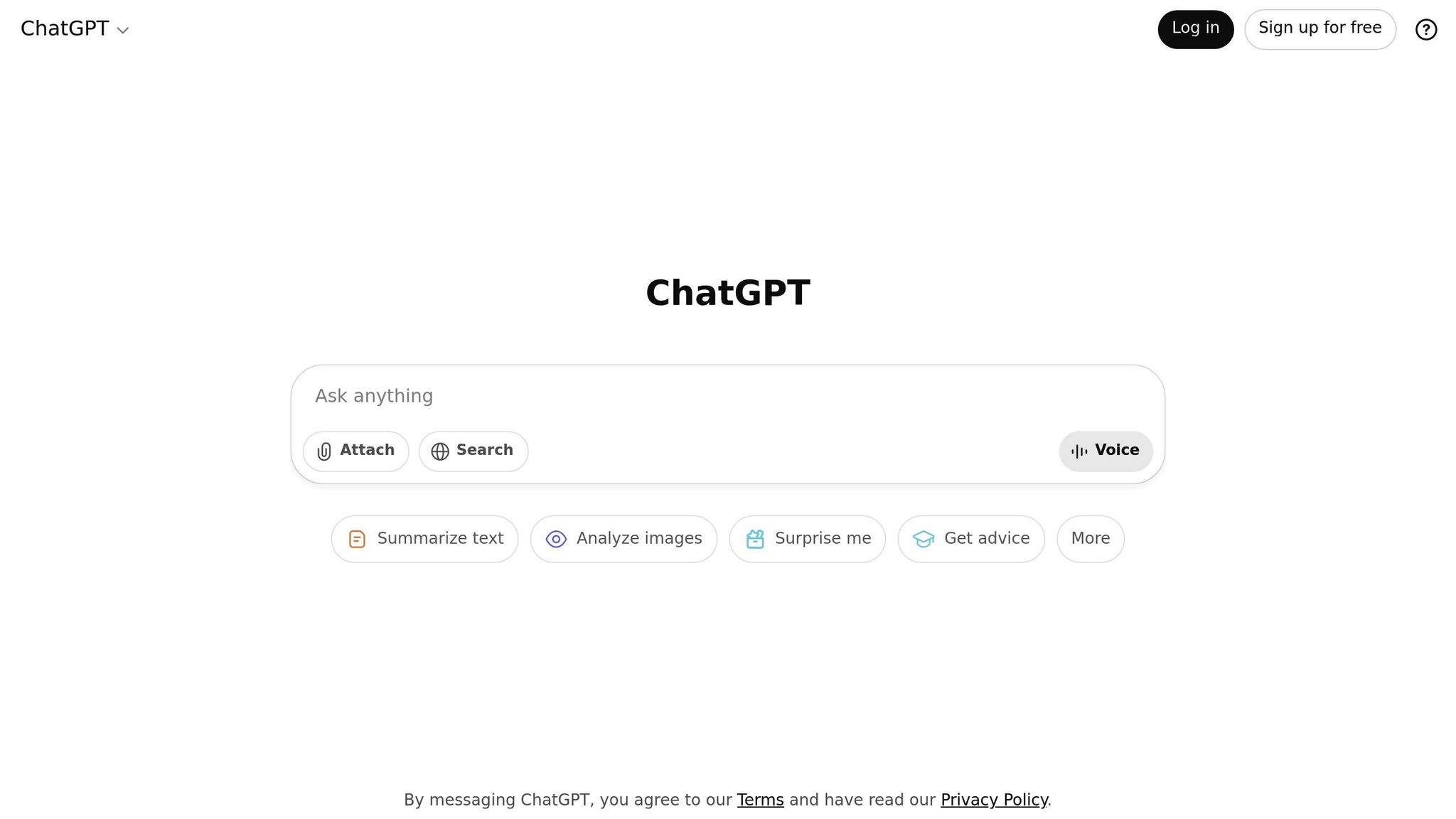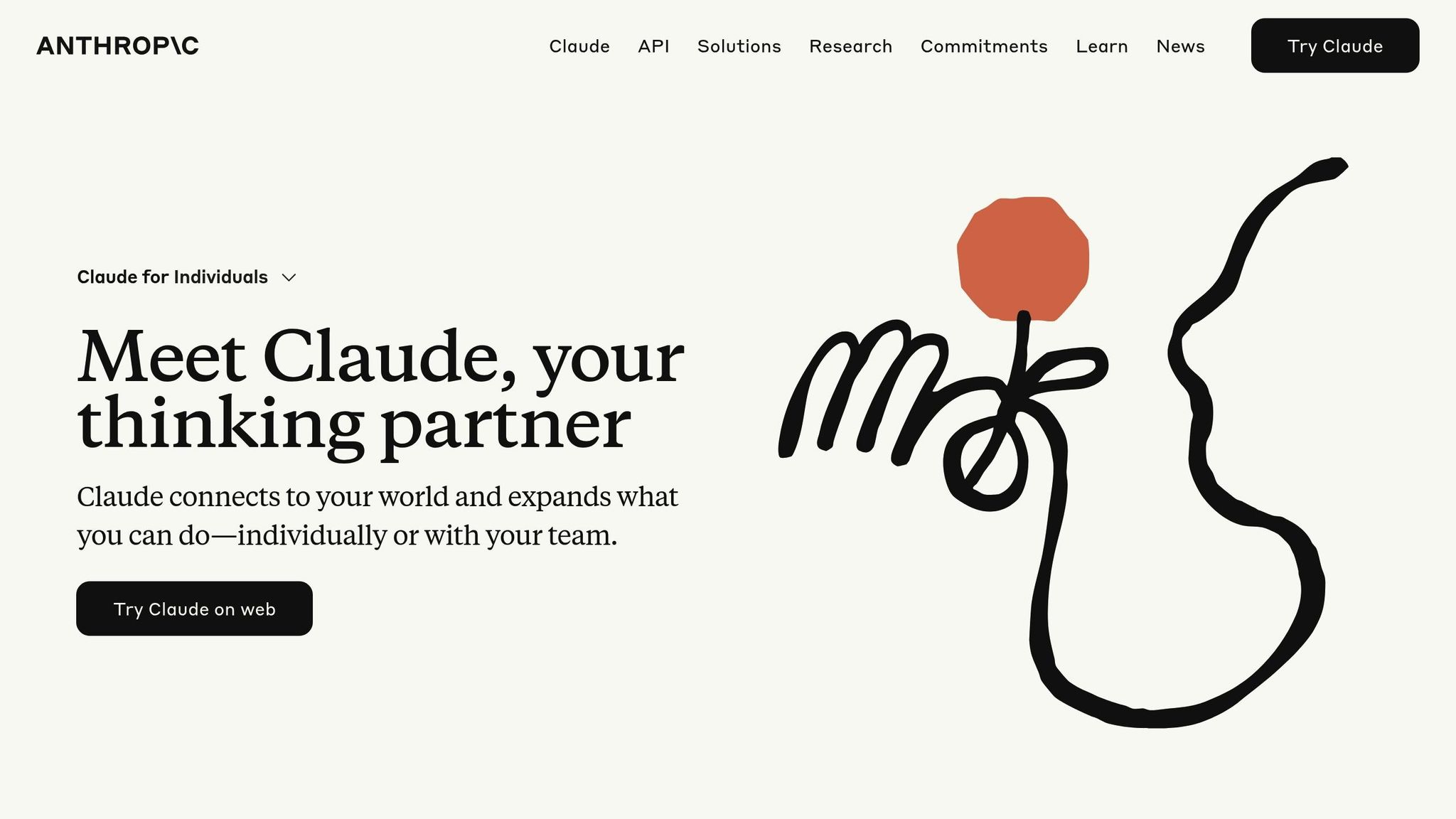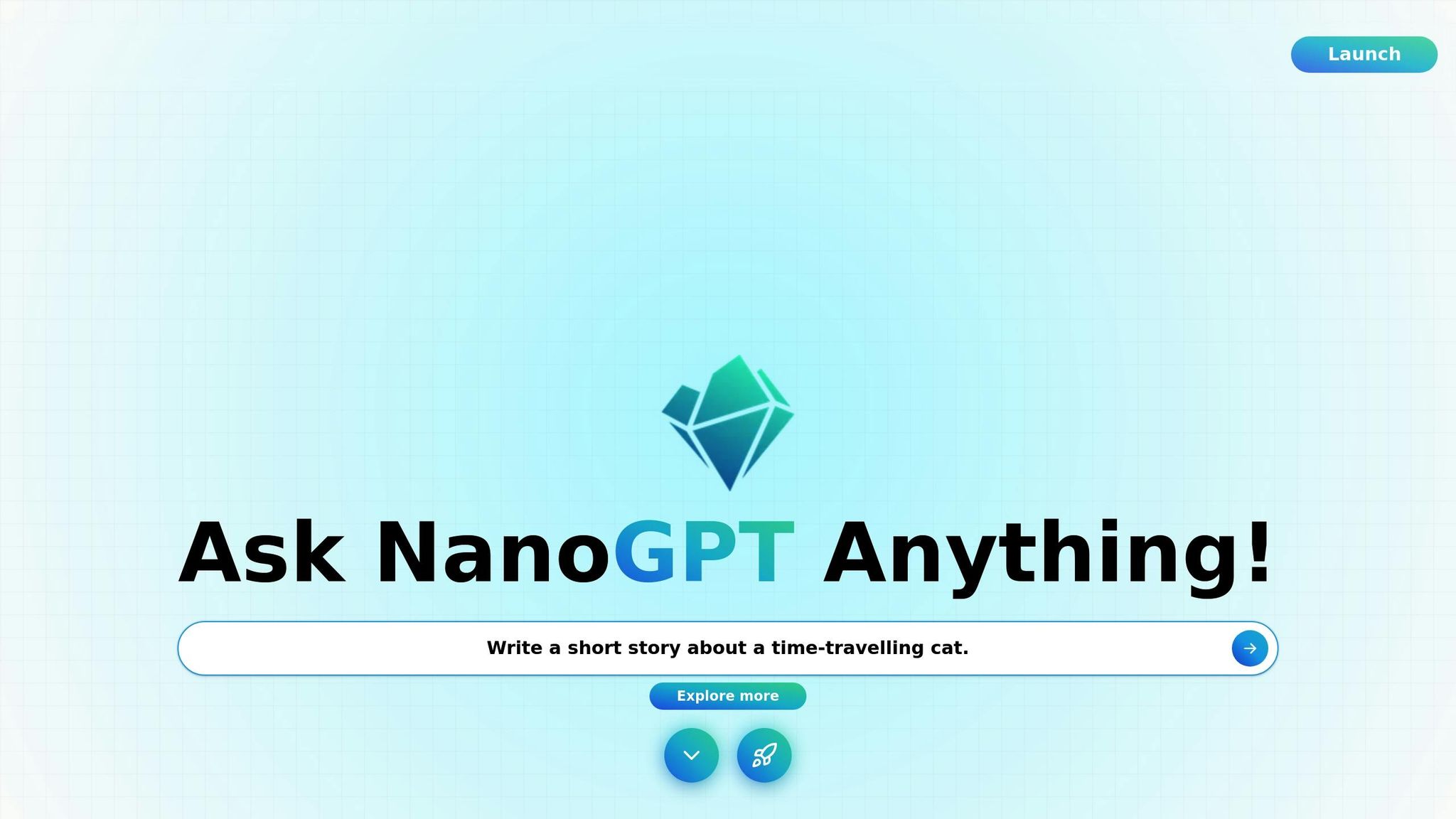Aug 6, 2025
ChatGPT leads the AI market but faces growing competition in 2025. With 800 million weekly users and dominance in general-purpose tasks, its new features like Study Mode and Advanced Voice Mode cater to diverse needs. However, rivals like Anthropic's Claude and Google's Gemini are challenging its position. Claude excels in coding and conversational writing, while Gemini offers cost-effective solutions and handles massive context lengths, making it ideal for complex tasks.
Key highlights:
Quick Comparison Table:
| Feature | ChatGPT | Claude | Gemini |
|---|---|---|---|
| Users (Weekly) | 800M | Not disclosed | Not disclosed |
| Coding | Basic capabilities | Advanced performance | Reliable |
| Cost | Subscription-based | Not disclosed | Affordable |
| Privacy | Moderate | Strong | Tiered approach |
| Context Length | 128,000 tokens | Not disclosed | 1 million tokens |
ChatGPT remains the default choice for most users, but specialized tasks may push users toward Claude or Gemini. NanoGPT simplifies access by combining multiple AI models under one platform, making it a flexible option for varied needs.

In 2025, ChatGPT rolled out several updates designed to improve user experience. Among the most talked-about additions are Study Mode and Agent Mode, both aimed at enhancing learning and problem-solving capabilities. These features highlight OpenAI's shift toward creating tools that emphasize meaningful progress over mere engagement.
One standout update is the Advanced Voice Mode, which delivers more natural and responsive voice interactions. This upgrade makes conversations smoother and more intuitive. Additionally, ChatGPT has expanded its integration capabilities, allowing users to connect seamlessly with external tools and services.
Another major milestone came in June 2025 with the release of o3-pro, the latest version of OpenAI's reasoning model. Available to Pro and Team users via ChatGPT and API, this model replaces the earlier o1-pro version. Enterprise and Edu users gained access shortly after. The o3-pro model excels in areas like science, education, programming, business, and writing assistance, offering better clarity, accuracy, and instruction-following. These advancements reflect ongoing changes in the AI landscape.
OpenAI CEO Sam Altman has been upfront about the experimental nature of these features, saying:
"I would explain this to my own family as cutting edge and experimental; a chance to try the future, but not something I'd yet use for high-stakes uses or with a lot of personal information until we have a chance to study and improve it in the wild."
Currently, ChatGPT processes an impressive 2.5 billion prompts daily, with 330 million coming from U.S. users alone. These updates have driven adoption among a wide range of users.
ChatGPT’s updates have struck a chord with a diverse group of users in the U.S. The platform continues to be the leading AI tool in the country, with 67.7 million active users. Younger generations, in particular, have embraced ChatGPT, with Millennials and Gen Z (ages 18–34) making up 53.94% of the user base, while mid-career professionals (ages 35–54) account for 32.6%. These numbers underscore the generational shift in comfort with AI technologies.
Professionals across various industries have also integrated ChatGPT into their workflows. For instance, 64% of journalists, 63% of software developers, and 65% of marketers use the platform regularly. Whether it’s for content creation, customer support, coding help, or data analysis, ChatGPT has proven to be a versatile tool.
Corporate adoption tells a similar story. 49% of companies are using ChatGPT, and among those, 93% plan to expand their usage. Additionally, over 80% of Fortune 500 companies adopted ChatGPT within the first nine months of its release. On an individual level, 43% of U.S. adults aged 18 to 29 have tried ChatGPT at least once.
Despite growing competition, ChatGPT remains the top player in the AI chatbot market. The platform serves 800 million active users and handles over 1 billion daily queries. The U.S. accounts for 16.18% of all ChatGPT visitors, making it the largest single-country user base.
However, the competitive landscape is shifting. Between April and June 2025, ChatGPT’s global market share dropped by 5%, with a 10.12% decline in the U.S., as rivals like Microsoft Copilot gained traction.
Financially, OpenAI continues to perform well. The company’s annual recurring revenue has climbed to $13 billion, up from $10 billion in June. This growth is supported by a robust subscriber base, including 10 million paying users across Plus, Team, and Pro tiers, along with 1 million commercial plan users.
OpenAI’s pricing strategy caters to a wide range of users. For example, the $20-per-month ChatGPT Plus subscription was made free for all college students in the U.S. and Canada through May. Meanwhile, enterprise customers may soon see a premium tier priced at $2,000 per month.
ChatGPT.com attracts approximately 5.24 billion visits each month, and OpenAI is aiming to reach 1 billion users by the end of 2025. With five million paying business users already on board, the platform continues to hold strong commercial appeal.
Nick Turley, OpenAI’s VP of Product, highlighted the platform’s impact:
"Every day, people and teams are learning, creating, and solving harder problems"
This emphasis on practical problem-solving has helped ChatGPT maintain its leadership even as new challengers enter the market. By evolving its capabilities, the platform sets a high bar for others to follow.
The AI landscape in 2025 is packed with advanced models vying for dominance. Anthropic's Claude Opus 4 has taken the lead in reasoning benchmarks, outperforming OpenAI's GPT-4.1. Meanwhile, Google's Gemini 1.5 has raised the bar with its ability to handle context lengths of up to one million tokens, making it a go-to choice for users working with extensive documents - far surpassing what ChatGPT's consumer version currently supports.
In the world of coding, Claude Code has emerged as the top choice, dominating programming-specific use cases and leaving other language models trailing behind. On the other hand, DeepSeek, a standout among Chinese AI models, has shown exceptional performance in mathematics and reasoning tasks. By 2024, the performance gap between Chinese and U.S. models had nearly disappeared, signaling a new level of competition in the global AI market.
Notably, key benchmarks have seen dramatic improvements: MMMU scores rose by 18.8 percentage points, GPQA by 48.9 percentage points, and SWE-bench by an impressive 67.3 percentage points. These advancements are not just technical milestones - they are fueling significant growth in the U.S. AI market.
The U.S. AI market is booming. By 2025, its value is projected at $173.56 billion, with forecasts predicting it will skyrocket to $851.46 billion by 2034, growing at a compound annual rate of 19.33%. This rapid expansion reflects how both established and emerging AI models are reshaping industries.
Business adoption has surged, with 78% of organizations reporting AI usage in 2024, a sharp increase from 55% in 2023. Generative AI is becoming a staple, with 71% of businesses using it in at least one function, up from 65% earlier in 2024. Private investment in AI within the U.S. also surged, reaching $109.1 billion in 2024.
Marketing professionals are among the most enthusiastic adopters. A whopping 84% use AI to align web content with search intent, and personalization driven by intent data has been shown to boost campaign ROI by up to 20%. However, not everyone is sold on AI-generated content - 52% of consumers report being less engaged when they suspect content is AI-driven. Still, the numbers don't lie: over 4 billion prompts are issued daily across platforms like OpenAI, Claude, Gemini, and Mistral. AI has firmly transitioned from experimental tech to a core business tool.
Corbett Drummey, VP of Brand Collaboration at Lightricks, sums it up well:
"AI offers a way to automate tasks, personalize customer experiences and gain a competitive edge."
As AI adoption grows, privacy has become a key factor in choosing a model. Anthropic's Claude stands out with its privacy-first design. By default, it avoids using user data for training, refrains from third-party data sharing, and ensures encrypted data transmissions while storing data only temporarily.
Google's Gemini takes a two-tiered approach. Free-tier users may have their inputs reviewed by human annotators, but enterprise customers benefit from stronger privacy protections, including clear data deletion options.
On the other hand, DeepSeek raises some red flags. The platform lacks a clear opt-out policy, and user inputs may be used for training unless the system is self-hosted. Additionally, concerns about data being sent to Chinese servers and known vulnerabilities in its mobile apps - such as unencrypted transmissions - have raised eyebrows about its security.
Cost efficiency has also improved dramatically. Between November 2022 and October 2024, the cost of running systems at GPT-3.5's level dropped by over 280-fold. Open-weight models are also closing the gap with closed systems, reducing the performance difference from 8% to just 1.7% on some benchmarks in just one year. With 69% of users preferring robots for quick answers, balancing convenience and privacy has become a critical challenge for providers and users alike.

Let’s break down how ChatGPT stacks up against its competitors, Claude and Gemini, in terms of features and performance for U.S. users. This comparison highlights each model's strengths and where they shine.
Here's a side-by-side look at how these AI models perform across key metrics and features relevant to U.S. users:
| Feature | ChatGPT | Claude | Gemini |
|---|---|---|---|
| Weekly Users | 300+ million | Not disclosed | Not disclosed |
| U.S. Market Share | 28% of Americans used in past 6 months | Not disclosed | 23% of Americans used in past 6 months |
| Coding Performance | Basic clone capabilities | Strong coding results (e.g., Tetris game) | Reliable coding with minor polish issues |
| Writing Style | Can cut too much copy | Excels in conversational tone | Tends to be overly verbose |
| Research Depth | Balanced reports (36 pages, 25 sources) | 7-page reports with 427 sources | 48-page reports with 100 sources |
| Voice Features | Natural flow, even sings | Not reported | Live camera debugging for real-time tasks |
| Memory Function | Remembers past conversations | Does not retain past conversations | Does not retain past conversations |
| Cost Efficiency | Not specified | Not specified | 20× less expensive than Claude 4 Sonnet |
This table provides a snapshot of each model's capabilities, offering a clearer picture of what they bring to the table.
Each model has carved out its own niche, excelling in areas that cater to different user needs:
Interestingly, data shows that 91% of AI users rely on general-purpose tools for most tasks, but 60% will switch to specialized tools when necessary. This trend highlights ChatGPT’s position as the default choice for many, while Claude and Gemini serve as valuable alternatives for specific needs.
For U.S. users, the choice often comes down to priorities: ChatGPT for everyday assistance, Claude for advanced coding and writing, and Gemini for cost-effective solutions and specialized features like video generation.

As AI models continue to evolve and competition in the market grows, NanoGPT steps in as a game-changer for U.S. users. Instead of juggling multiple subscriptions, users can now access a single platform that brings together leading AI models. NanoGPT meets the rising demand for flexible AI tools by offering access to ChatGPT, Deepseek, Gemini, Flux Pro, Dall-E, and Stable Diffusion - all under one roof. Designed with privacy and cost control in mind, this streamlined approach delivers practical advantages through efficient pricing and secure data handling.
NanoGPT uses a pay-as-you-go model starting at just $0.10, eliminating the hassle of recurring fees. This pricing method reflects a broader industry shift, with 67% of SaaS companies now incorporating usage-based charges - an increase from 52% in 2022. The flexible structure is ideal for users with varying AI needs, whether it's a student working on occasional projects or a professional with fluctuating workloads.
One standout feature is NanoGPT's commitment to privacy. Unlike traditional cloud-based AI platforms, NanoGPT stores user data locally on the device. This ensures that sensitive information remains secure, a feature that resonates strongly with Americans who want AI tools without risking their personal data. By combining cost efficiency with a privacy-first approach, NanoGPT offers a solution that prioritizes both user convenience and security.
Another key benefit is the platform's persistent balance tracking. Users only pay for what they use, removing the pressure to "get their money's worth" from a monthly subscription.
"Your pricing is the exchange rate on the value you're creating in the world." – Patrick Campbell, Founder & CEO, ProfitWell
This philosophy underpins NanoGPT’s pricing strategy: users pay solely for the value they receive, avoiding the commitment of fixed monthly fees.
NanoGPT brings together text and image generation models within a single, user-friendly interface, making it easy to switch between tools. Whether it’s ChatGPT for conversations, Gemini for cost-effective solutions, or Dall-E for creating images, the platform offers seamless transitions between models. Research shows that companies using consumption-based pricing see an annual revenue growth of 29.9%, compared to the SaaS average of 21.7%. This suggests that usage-based models provide real value to both providers and users alike.
For individual users, this translates into lower upfront costs and the ability to scale usage as needed without penalties. NanoGPT is especially useful for those who rely on multiple AI models for different tasks. For instance, a content creator could use ChatGPT to draft blog outlines, Flux Pro for detailed project planning, and Stable Diffusion to generate visuals - all from one platform with transparent, per-use pricing. No need to juggle separate subscriptions or worry about hidden fees.
As we head into 2025, the AI landscape is defined by a variety of models, each with its own strengths. ChatGPT shines in creative writing, coding, and general tasks, offering a 128,000-token context window and automatic memory capabilities. Gemini, on the other hand, stands out with its advanced multimodal features and a staggering 1 million-token context window, making it a top choice for those deeply integrated into Google's ecosystem. Meanwhile, DeepSeek AI dominates in data analysis, boasting 671 billion parameters and achieving a 90% accuracy rate in mathematical computations. Claude earns recognition for its focus on ethical AI practices.
These technical advantages come with varied pricing structures. Premium subscriptions range from $20 to over $200 per month, which can make accessing multiple models for specialized tasks both costly and inconvenient.
This is where NanoGPT comes in, offering a streamlined solution. Instead of juggling multiple subscriptions or choosing between models, NanoGPT provides access to leading AI tools, including ChatGPT, Gemini, and DeepSeek, all through a single pay-as-you-go system. Starting at just $0.10 per use, it simplifies the process. George Coxon praised the platform, saying:
"It's absolutely brilliant - I share it with anyone who ever mentions Chat-GPT including when I did a panel for ARU on the AI revolution - the students were pretty excited at not paying a subscription!"
As AI's market is projected to surpass $3 trillion by 2034, platforms like NanoGPT present a practical option for American users. With its transparent per-use pricing and local data storage, NanoGPT not only ensures privacy but also makes cutting-edge AI tools accessible without the burden of high costs.
In 2025, ChatGPT continues to shine with its wide-ranging abilities and knack for creativity, making it a go-to tool for various tasks. Meanwhile, Claude sets itself apart with a focus on empathetic communication and ethical AI principles. Then there's Gemini, which stands out for its precision and efficiency in managing factual, real-time workflows.
Looking at performance, ChatGPT is celebrated for its extensive functionality and flexibility. Claude often earns recognition for delivering responses that feel intuitive and conversational, almost human. Gemini, on the other hand, is the preferred choice for those needing accurate and timely information. While ChatGPT holds a leading market position in the U.S., Claude and Gemini have carved out their own niches, thriving on their specialized strengths and contributing to a dynamic AI landscape.
In 2025, ChatGPT continues to lead the pack among AI models, drawing in an impressive 800 million weekly active users and 160 million daily active users. This represents a staggering fourfold increase in usage compared to the previous year, cementing its status as the most widely used AI tool globally.
Even with competitors like Google Gemini and Claude entering the scene, ChatGPT maintains its dominance, especially in the United States. Here, it commands a market share estimated between 59% and 86%, depending on how easily users can switch to other platforms. Its enduring popularity can be attributed to its reliable performance, diverse features, and the strong trust it has built with its users.
By 2025, ChatGPT includes several privacy-focused options, such as letting users opt out of data being used for training and offering temporary chat modes for added discretion. That said, unless users specifically disable it, the platform still collects prompts and interactions to refine its models. Recently, concerns have surfaced about conversations potentially being accessible through search engines, and some earlier privacy features have been phased out.
OpenAI underscores its commitment to trust and security, but challenges persist around data retention and access. When compared to other AI models, ChatGPT continues to face questions about its ability to safeguard user privacy, underscoring the ongoing need for advancements in data protection.